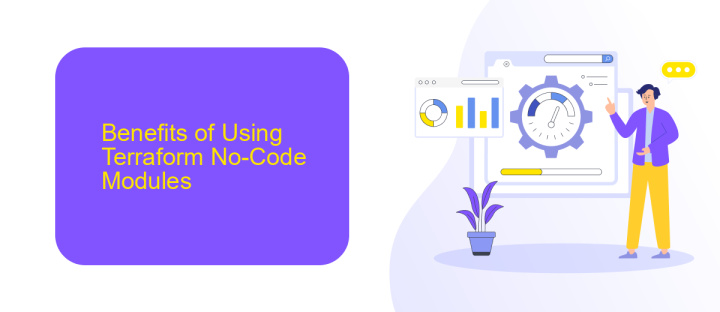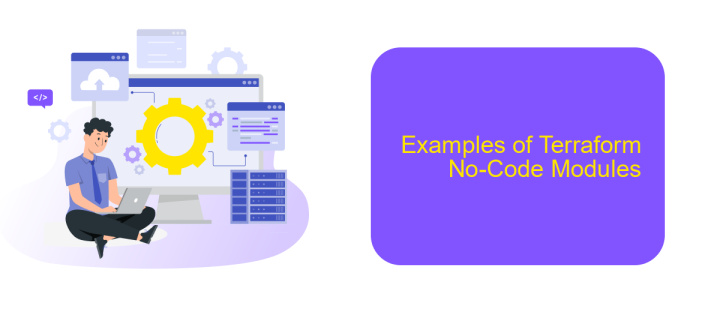Terraform No-Code Modules
Terraform, a powerful tool for infrastructure as code, has revolutionized how we manage and deploy cloud resources. However, for those without coding expertise, its complexity can be daunting. Enter Terraform No-Code Modules, a game-changer that simplifies the process. These modules allow users to leverage Terraform's capabilities without writing a single line of code, making cloud infrastructure management accessible to everyone.
Introduction
Terraform No-Code Modules simplify the process of infrastructure management by allowing users to deploy and manage cloud resources without writing any code. This approach is particularly beneficial for teams that lack extensive coding expertise but still need to manage complex infrastructure setups efficiently.
- Ease of use: No need to write complex scripts.
- Time-saving: Faster deployment of cloud resources.
- Scalability: Easily manage and scale infrastructure.
- Collaboration: Enables non-developers to contribute to infrastructure management.
By leveraging Terraform No-Code Modules, organizations can streamline their infrastructure processes and improve productivity. Additionally, integrating services like ApiX-Drive can further enhance these capabilities by automating data transfers and workflows, ensuring seamless integration between different systems and tools.
Benefits of Using Terraform No-Code Modules

Terraform No-Code Modules offer significant advantages for organizations looking to streamline their infrastructure management. One of the primary benefits is the reduction of complexity in deploying and managing cloud resources. By using pre-configured modules, teams can avoid writing extensive code, thus minimizing the risk of errors and reducing the time spent on debugging and maintenance. This approach allows even non-developers to participate in the infrastructure setup, fostering greater collaboration across different teams within the organization.
Another key benefit is the ease of integration with other tools and services. For instance, integrating Terraform No-Code Modules with ApiX-Drive can further enhance automation and efficiency. ApiX-Drive enables seamless data transfer between various applications, ensuring that your infrastructure remains synchronized with other business processes. This integration can lead to more robust and reliable systems, as well as improved data consistency across platforms. Overall, Terraform No-Code Modules provide a simplified yet powerful solution for managing cloud infrastructure, making it accessible to a broader range of users while maintaining high standards of reliability and efficiency.
How to Use Terraform No-Code Modules

Using Terraform No-Code Modules simplifies the process of managing infrastructure by eliminating the need for extensive coding. These modules are pre-built and reusable, allowing you to deploy resources quickly and efficiently without writing complex scripts.
- Start by selecting a suitable Terraform No-Code Module from the Terraform Registry.
- Configure the module by filling in the required variables in a user-friendly interface.
- Integrate with your cloud provider by providing necessary credentials and settings.
- Deploy the module to your environment with a single click or command.
- Monitor and manage the deployed resources through the provided dashboards and tools.
For seamless integration with other services, consider using ApiX-Drive to automate data transfers and workflows between your infrastructure and external applications. This service helps synchronize data and ensures that your deployments are always up-to-date, enhancing the overall efficiency of your infrastructure management.
Examples of Terraform No-Code Modules

Terraform No-Code Modules provide a simplified way to manage infrastructure without writing extensive code. These modules are pre-configured templates that allow users to deploy resources quickly and efficiently. They are particularly useful for teams who want to streamline their DevOps processes and reduce the learning curve associated with traditional Terraform scripting.
One of the key advantages of using Terraform No-Code Modules is the ability to integrate various services seamlessly. For instance, ApiX-Drive can be used to automate data flows between different applications and services, further enhancing the capabilities of your infrastructure setup. By leveraging such integrations, teams can focus more on strategic tasks rather than manual configurations.
- Deploying a basic web server with pre-configured settings
- Setting up a secure VPC (Virtual Private Cloud) with minimal input
- Automating the creation of databases and storage solutions
- Integrating third-party services like ApiX-Drive for automated workflows
These examples illustrate the versatility and efficiency of Terraform No-Code Modules. By utilizing these pre-built templates, organizations can achieve faster deployment times and maintain a consistent infrastructure setup. This approach not only saves time but also minimizes the risk of errors, making it an ideal solution for modern DevOps practices.
Best Practices for Using Terraform No-Code Modules
When working with Terraform No-Code Modules, it is essential to maintain a clear and organized structure. Start by defining a consistent naming convention for your modules and resources to ensure easy identification and management. Utilize version control systems like Git to track changes and collaborate effectively with your team. This practice helps in maintaining a history of modifications and facilitates rollback if necessary.
Another best practice is to leverage automation tools to streamline integrations and deployments. For instance, using services like ApiX-Drive can simplify the process of connecting Terraform with other platforms and applications, reducing manual effort and minimizing errors. Additionally, always validate and test your configurations in a staging environment before applying them to production. Regularly review and update your modules to incorporate improvements and security patches, ensuring your infrastructure remains robust and up-to-date.
FAQ
What are Terraform No-Code Modules?
How do I integrate Terraform No-Code Modules with my existing workflow?
Can I customize Terraform No-Code Modules to fit my specific needs?
Are Terraform No-Code Modules suitable for complex infrastructure setups?
How do I ensure the security of my infrastructure when using Terraform No-Code Modules?
Apix-Drive will help optimize business processes, save you from a lot of routine tasks and unnecessary costs for automation, attracting additional specialists. Try setting up a free test connection with ApiX-Drive and see for yourself. Now you have to think about where to invest the freed time and money!

